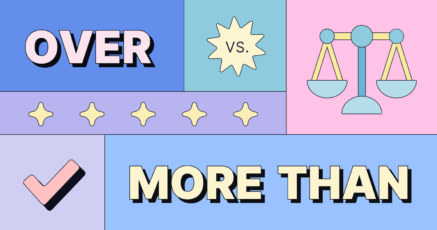Commonly Confused Words - Page 6
 When to Use Over vs. More ThanIf you’ve ever dealt with an editor or teacher who always changes over to more than in your writing, you’re not alone. And you...March 9, 2023
When to Use Over vs. More ThanIf you’ve ever dealt with an editor or teacher who always changes over to more than in your writing, you’re not alone. And you...March 9, 2023 When to Use “Who” vs. “Whom”Who is used to refer to the subject of a sentence or clause (the person performing an action). Whom is used to refer to the...February 24, 2023
When to Use “Who” vs. “Whom”Who is used to refer to the subject of a sentence or clause (the person performing an action). Whom is used to refer to the...February 24, 2023 When to Use Who vs. ThatMany people use the words who and that interchangeably, but it’s important to know the difference between them. In short, who is...February 17, 2023
When to Use Who vs. ThatMany people use the words who and that interchangeably, but it’s important to know the difference between them. In short, who is...February 17, 2023 Single vs. Double Quotation MarksIn American English, we use double quotation marks ( “ ” ) in most situations and single quotation marks ( ‘ ’ ) only for quotes...January 17, 2023
Single vs. Double Quotation MarksIn American English, we use double quotation marks ( “ ” ) in most situations and single quotation marks ( ‘ ’ ) only for quotes...January 17, 2023 Where vs. In Which vs. WhereinWhere and wherein may look and sound similar, but in reality they have different meanings. In fact, wherein can be another way of...January 12, 2023
Where vs. In Which vs. WhereinWhere and wherein may look and sound similar, but in reality they have different meanings. In fact, wherein can be another way of...January 12, 2023 When to Use Accept vs. ExceptThe English language has many words that are spelled or pronounced similarly. Accept and except are on the list of commonly...November 22, 2022
When to Use Accept vs. ExceptThe English language has many words that are spelled or pronounced similarly. Accept and except are on the list of commonly...November 22, 2022 Its vs. It’s: Learn the DifferenceHave you ever mixed up its and it’s and then realized you don’t actually know for certain when the apostrophe is needed and when...November 10, 2022
Its vs. It’s: Learn the DifferenceHave you ever mixed up its and it’s and then realized you don’t actually know for certain when the apostrophe is needed and when...November 10, 2022 How to Use Nowhere, Somewhere, Everywhere, AnywhereThe English language is filled with words that have similar spellings or root words, but that mean completely different things....November 4, 2022
How to Use Nowhere, Somewhere, Everywhere, AnywhereThe English language is filled with words that have similar spellings or root words, but that mean completely different things....November 4, 2022 “A Lot” vs. “Allot” vs. “Alot”: What’s the Difference?The English language is teeming with idiosyncrasies that can cause confusion, including differentiating between a lot, alot, and...October 10, 2022
“A Lot” vs. “Allot” vs. “Alot”: What’s the Difference?The English language is teeming with idiosyncrasies that can cause confusion, including differentiating between a lot, alot, and...October 10, 2022 “There” vs. “Their” vs. “They’re”: What’s the Difference?Cite and sight. Flower and flour. Hole and whole. When spoken aloud, these pairs of words sound exactly alike, but they are in...September 22, 2022
“There” vs. “Their” vs. “They’re”: What’s the Difference?Cite and sight. Flower and flour. Hole and whole. When spoken aloud, these pairs of words sound exactly alike, but they are in...September 22, 2022